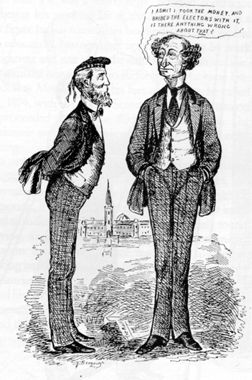Article
Pipeline Debate, 1956
The Pipeline Debate, 8 May-6 June 1956, was one of the most famous confrontations in Canadian parliamentary history.

Enter your search term
Signing up enhances your TCE experience with the ability to save items to your personal reading list, and access the interactive map.
Create AccountArticle
The Pipeline Debate, 8 May-6 June 1956, was one of the most famous confrontations in Canadian parliamentary history.
"https://d3d0lqu00lnqvz.cloudfront.net/media/media/5b52b570-6e9b-476a-94a9-af4ca135ac51.jpg" // resources/views/front/categories/view.blade.phphttps://d3d0lqu00lnqvz.cloudfront.net/media/media/5b52b570-6e9b-476a-94a9-af4ca135ac51.jpg

Article
Piracy is traditionally defined as the seizure and robbery of craft at sea or in the air. Though piracy had only a small role in Canada’s history, it has been the subject of legendary tales over the years. Pirates traversed the Atlantic coast of the country during the 17th and 18th centuries, plundering and causing mayhem wherever they went. Stories about pirates like Peter Easton and Bartholomew Roberts remain a part of local histories. While maritime piracy is no longer a significant threat in Canada, it remains so in parts of Asia, Africa, South America and Central America. The Canadian Armed Forces have assisted in anti-piracy missions in various parts of the world. In the modern age, piracy has taken on new forms, such as virtual crime and digital theft. Online piracy poses threats to the Canadian people, industries and economy.
"https://www.thecanadianencyclopedia.ca/images/tce_placeholder.jpg?v=e9dca980c9bdb3aa11e832e7ea94f5d9" // resources/views/front/categories/view.blade.phphttps://www.thecanadianencyclopedia.ca/images/tce_placeholder.jpg?v=e9dca980c9bdb3aa11e832e7ea94f5d9

Macleans
The new Maritime quest for unity began during those achingly anxious hours when Quebecers counted their ballots and decided the fate of the entire country. As the tally in last October's referendum seesawed back and forth, Liberal MP George Rideout, a former mayor of Moncton, N.B.This article was originally published in Maclean's Magazine on February 5, 1996
"https://www.thecanadianencyclopedia.ca/images/tce_placeholder.jpg?v=e9dca980c9bdb3aa11e832e7ea94f5d9" // resources/views/front/categories/view.blade.phphttps://www.thecanadianencyclopedia.ca/images/tce_placeholder.jpg?v=e9dca980c9bdb3aa11e832e7ea94f5d9

Macleans
How North Vancouver’s Rebecca Rubin landed in the crosshairs of the biggest eco-terrorism investigation in U.S. history, and spent 10 years on the run. Ken MacQueen on a tale of sabotage, conspiracy, violence and betrayal.
"https://www.thecanadianencyclopedia.ca/images/tce_placeholder.jpg?v=e9dca980c9bdb3aa11e832e7ea94f5d9" // resources/views/front/categories/view.blade.phphttps://www.thecanadianencyclopedia.ca/images/tce_placeholder.jpg?v=e9dca980c9bdb3aa11e832e7ea94f5d9

Article
Plea Bargaining is a form of negotiation between a person charged with an offence and a crown prosecutor. The accused person usually negotiates through his counsel. Plea bargaining can take several forms.
"https://www.thecanadianencyclopedia.ca/images/tce_placeholder.jpg?v=e9dca980c9bdb3aa11e832e7ea94f5d9" // resources/views/front/categories/view.blade.phphttps://www.thecanadianencyclopedia.ca/images/tce_placeholder.jpg?v=e9dca980c9bdb3aa11e832e7ea94f5d9

Macleans
If omens mean anything, the members of Prime Minister Jean CHRÉTIEN's new version of Team Canada may have some cause for concern.This article was originally published in Maclean's Magazine on January 20, 1997
"https://www.thecanadianencyclopedia.ca/images/tce_placeholder.jpg?v=e9dca980c9bdb3aa11e832e7ea94f5d9" // resources/views/front/categories/view.blade.phphttps://www.thecanadianencyclopedia.ca/images/tce_placeholder.jpg?v=e9dca980c9bdb3aa11e832e7ea94f5d9

Article
The first band affiliated with the North-West Mounted Police was formed in 1876. During the next 30 years, the force had about seven bands. An official RCMP band was formed in 1938 and first performed in 1939, including at the royal visit by King George VI and Queen Elizabeth. Other RCMP bands were also active throughout the 1950s and particularly during Canada’s centennial celebrations in 1967. The RCMP band disbanded in 1994.
"https://d3d0lqu00lnqvz.cloudfront.net/Edmonton-Police-08412.jpg" // resources/views/front/categories/view.blade.phphttps://d3d0lqu00lnqvz.cloudfront.net/Edmonton-Police-08412.jpg

Article
The police village, a category of local governing body in Ontario, predates Confederation. The original purpose was to establish a local body in a hamlet ("village") to maintain public order (hence "police") and deliver a limited number of services to rural township dwellers.
"https://www.thecanadianencyclopedia.ca/images/tce_placeholder.jpg?v=e9dca980c9bdb3aa11e832e7ea94f5d9" // resources/views/front/categories/view.blade.phphttps://www.thecanadianencyclopedia.ca/images/tce_placeholder.jpg?v=e9dca980c9bdb3aa11e832e7ea94f5d9

Article
Canadian politicians have never been particularly literate, their skills running more to the mastery of stump orations and the management of patronage than to writing literate accounts of their political lives.
"https://www.thecanadianencyclopedia.ca/images/tce_placeholder.jpg?v=e9dca980c9bdb3aa11e832e7ea94f5d9" // resources/views/front/categories/view.blade.phphttps://www.thecanadianencyclopedia.ca/images/tce_placeholder.jpg?v=e9dca980c9bdb3aa11e832e7ea94f5d9

Article
A political campaign is an organized effort to secure the nomination and election of people seeking public office. In a representative democracy, electoral campaigns are the primary means by which voters are informed of a political party’s policy or a candidate’s views. The conduct of campaigns in Canada has evolved gradually over nearly two centuries. It has adapted mostly British and American campaign practices to the needs of a parliamentary federation with two official languages. Campaigns occur at the federal, provincial, territorial and municipal levels. Federal and provincial campaigns are party contests in which candidates represent political parties. Municipal campaigns — and those of Northwest Territories and Nunavut — are contested by individuals, not by parties.
"https://d3d0lqu00lnqvz.cloudfront.net/media/media/51788a6e-f564-4178-8b99-f03ca047859b.jpg" // resources/views/front/categories/view.blade.phphttps://d3d0lqu00lnqvz.cloudfront.net/media/media/51788a6e-f564-4178-8b99-f03ca047859b.jpg

Article
The art of the political cartoon as we know it in Canada today began in the 1870s when John W. Bengough (1851-1923) started publishing his satirical magazine, Grip.
"https://d3d0lqu00lnqvz.cloudfront.net/media/media/328f6d21-a974-419a-affb-e749bf478c7c.jpg" // resources/views/front/categories/view.blade.phphttps://d3d0lqu00lnqvz.cloudfront.net/media/media/328f6d21-a974-419a-affb-e749bf478c7c.jpg

Article
Political culture refers to the collective opinions, attitudes and values of individuals about POLITICS. There are 2 traditional approaches to the study of political culture. The "individualistic" approach examines the values and attitudes of individuals, frequently through the use of surveys.
"https://www.thecanadianencyclopedia.ca/images/tce_placeholder.jpg?v=e9dca980c9bdb3aa11e832e7ea94f5d9" // resources/views/front/categories/view.blade.phphttps://www.thecanadianencyclopedia.ca/images/tce_placeholder.jpg?v=e9dca980c9bdb3aa11e832e7ea94f5d9

Article
Political Economy is the study of the relationship between POLITICS and ECONOMICS.
"https://www.thecanadianencyclopedia.ca/images/tce_placeholder.jpg?v=e9dca980c9bdb3aa11e832e7ea94f5d9" // resources/views/front/categories/view.blade.phphttps://www.thecanadianencyclopedia.ca/images/tce_placeholder.jpg?v=e9dca980c9bdb3aa11e832e7ea94f5d9

Article
Political history is the study of the processes, activities and institutions of governments, the influences on them and the individuals involved with them.
"https://www.thecanadianencyclopedia.ca/images/tce_placeholder.jpg?v=e9dca980c9bdb3aa11e832e7ea94f5d9" // resources/views/front/categories/view.blade.phphttps://www.thecanadianencyclopedia.ca/images/tce_placeholder.jpg?v=e9dca980c9bdb3aa11e832e7ea94f5d9

Article
Canadians participate in the political system any time they voluntarily try to influence the outcome of an election, or a government or party policy. This can be done in various ways, from voting to campaigning for a political cause to running for political office. The highest turnout rate for a federal election was 79.4 per cent in 1958. Voter turnout in Canada declined in the 1990s and 2000s, reaching 58.8 per cent in 2008. The numbers then began trending upwards, reaching 68.3 per cent in 2015 and 67 per cent in 2019. Women, who gained the right to vote federally in 1918, vote at slightly higher rates than men. Older citizens are more politically active than younger ones, although voting among people age 18 to 34 increased sharply between 2011 and 2019.
"https://d3d0lqu00lnqvz.cloudfront.net/media/media/88bab6f6-366c-45d5-be02-092e23d46e97.jpg" // resources/views/front/categories/view.blade.phphttps://d3d0lqu00lnqvz.cloudfront.net/media/media/88bab6f6-366c-45d5-be02-092e23d46e97.jpg
